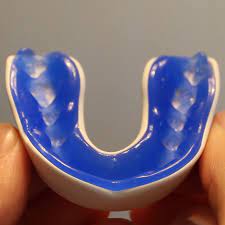Sports Dentistry
Dr. Priya
Dr. Priya is designated as a Certified Team Dentist by the Academy for Sports Dentistry, where she received training in sports-related dental injuries and trauma, protective mouthguards, and injury prevention.
The Academy for Sports Dentistry is made up of dentists, coaches, students, oral surgeons, and physicians, with the common goal of spreading awareness regarding sports related injuries and prevention.
Click below to learn more about :
Sports Dentistry Facts
Facts from the National Youth Sports Foundation for Safety
- Dental injuries are the most common type of orofacial injury sustained when participating in sports, the majority being preventable.
- An athlete is 60x more likely to damage their teeth when not wearing a protective mouthguard.
- The cost of a fractured tooth is many times greater than the cost of a dentist diagnosed and designed professionally made mouthguard. Replacing a tooth can cost upwards of $5000.
- Every athlete involved in contact sport has about 10% chance per season of an orofacial injury, or 33-56% chance during an athletic career.
- It is estimated that faceguards and mouthguards prevent approximately 200,000 injuries each year in high school and college football.
- The stock mouthguard, which is bought at sports stores, provides only a low level of protection, if any. It is not custom fit to a bite and if often not secured appropriately to the teeth, making it a potential choking hazard.
- There is no evidence that an athletic mouthguard lessens the degree of a cerebral concussion.
- Mouthguards should always be worn during competition, practice and games.
- The American Dental Association recommends wearing custom mouthguards for the following sports: acrobats, basketball, boxing, field Hockey, football, gymnastics, handball, ice hockey, lacrosse, martial arts, racquetball, roller hockey, rugby, shot putting, skateboarding, skiing, skydiving, soccer, squash, surfing, volleyball, water polo, weightlifting, wrestling.
Athletic Injuries and Trauma
Knocked Out Teeth
The main causes of knocked out teeth are sports injuries and fights. Knocked out teeth can often be re-implanted under favorable conditions. If it can be replanted within minutes, there is a greater chance for the tooth to be retained for life.
What to do if your tooth gets knocked out:
- Locate the tooth and pick it up by the crown or enamel, NOT the root.
- An athlete is 6If the tooth is dirty or contaminated, it should be gently rinsed with milk or HBSS ideally, or water if no other solution is available.0x more likely to damage their teeth when not wearing a protective mouthguard.
- DO store it in milk or HBSS. Less ideally, saline or saliva. Do NOT store the tooth in water. Water damages the root surface of the cells.
- If it is a baby tooth, it should NOT be re-implanted. Re-implanting a baby tooth can affect the adult tooth that is growing beneath it.
- The critical time frame is 5 minutes – 1 hour. This means you may not be able to make it to a dentist before re-implanting the tooth. You may have to do it before arriving to the dentist. The prognosis becomes poor if re-implanted after 5 minutes. It is important that parents, coaches, caregivers and athletic trainers are educated on proper first aid in the event of a traumatic avulsion injury. The tooth must be immediately re-implanted within 5 minutes, most likely at the site of injury. By the time you reach the dental office, it may be too late.
- Do NOT re-implant a tooth if the injured person is unconscious, as it is a choking hazard.
- Always check for signs of head injury: unconsciousness, nausea, or persistent headaches. If there are signs of a head injury, they should ALWAYS be FIRST evaluated by proper medical personnel.
*Treatment of choice is immediate reimplantation after rinsing the tooth if necessary. Immediately visit a dentist for proper splinting and evaluation. If you cannot re-implant the tooth, then store it in milk or HBSS when in route to the dentist.
Fractured Teeth
Teeth can fracture in many ways. If you are able to locate the fractured piece, it is possible your dentist may be able to utilize it to restore your tooth. It is important to visit the dentist as soon as possible after trauma for evaluation and treatment as necessary.
Athletic Mouthguards
Properly diagnosed, designed and custom fabricated mouthguards are essential for the prevention of athletic oral/facial injuries. A properly fitted mouthguard must be protective, comfortable, resilient, tear resistant, odorless, tasteless, not bulky, cause minimal interference to speaking and breathing, and have excellent retention and fit.
There are 4 types of mouthguards :
Stock Mouthguards
Stock Mouthguards are available at most sporting good stores. They can be worn immediately after unpackaging. They are bulky, lack retention, and must be held in place by constantly biting down. This interferes with speech, breathing, and can cause undue strain on facial muscles/joints. This type of mouthguard is the least ideal for many reasons.

Boil and Bite
Boil and Bite Mouthguards are the most commonly used mouthguard on the market. They are unpackaged, placed in boiling water, and formed in the mouth with finger pressure and biting. They often have poor retention, lead to difficulty speaking, and can have gagging effects. Often, molding the mouthguard can decrease the thickness in vital areas, leading to a false sense of protection. Although the most popular, this type of mouthguard is not recommended by the Academy for Sports Dentistry.
Custom-made Mouthguards
Custom-made Mouthguards are supplied by your dentist. They provide the dentist with the critical ability to address several important issues in the fitting of the mouthguard. Our mouthguards are specifically made with a pressurized thermoform, allowing for the best fit and adaptation to the teeth. It also allows us to create selective thickness in high-risk areas without over-bulking the rest of the guard, while utilizng a flexible and comfortable material that is less likely to deform with long-term wear.
Alternatively, they can be made using a vacuum, which may not provide the same level of adaptation.
These custom guards are designed and made by your dentist. Compared to over-the-counter guards, custom guards are made from molds of your mouth. This allows for close adapation to your teeth, less interference with breathing and speaking, more retention, more comfort, and better stability of the materials.
These can be custom made with your team colors and logos. This type of mouthguard is strongly recommended to athletes of all ages.
Your dentist may ask:
- What sport is being played?
- The age of the patient (will teeth erupt / do we need space?)
- Will the design be appropriate for the level of competition?
- Does the patient have any history of dental injury and need additional protection in a certain area?
- Is the athlete currently in Braces or Invisalign? (Yes! We can make athletic guards for athletes who are in orthodontic treatment!)
- Does the patient have cavities? Missing teeth?
